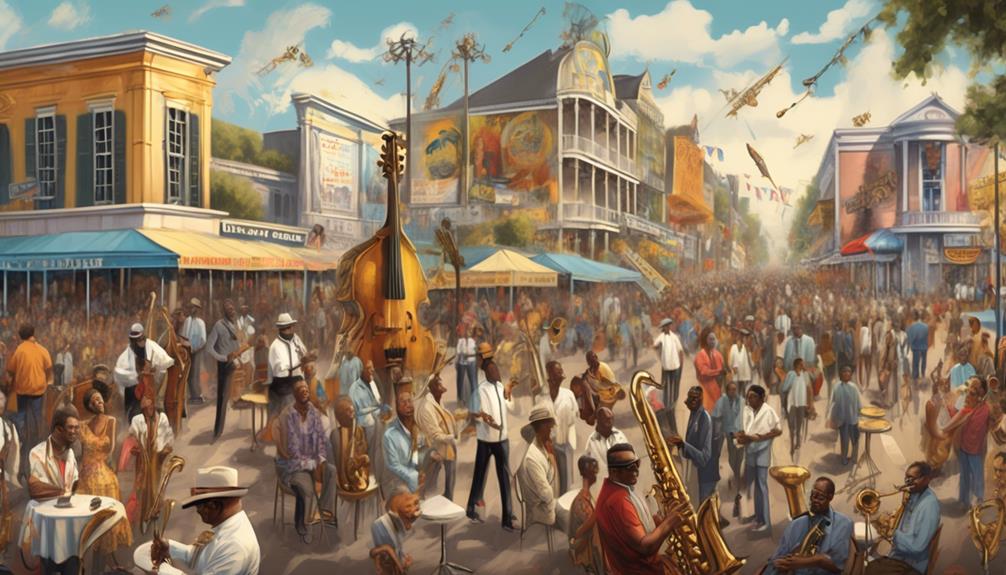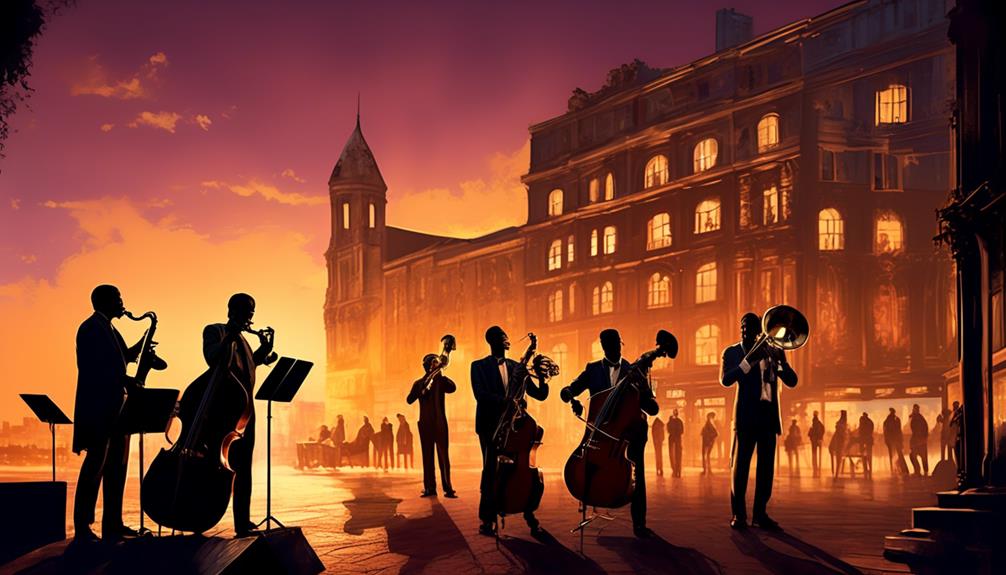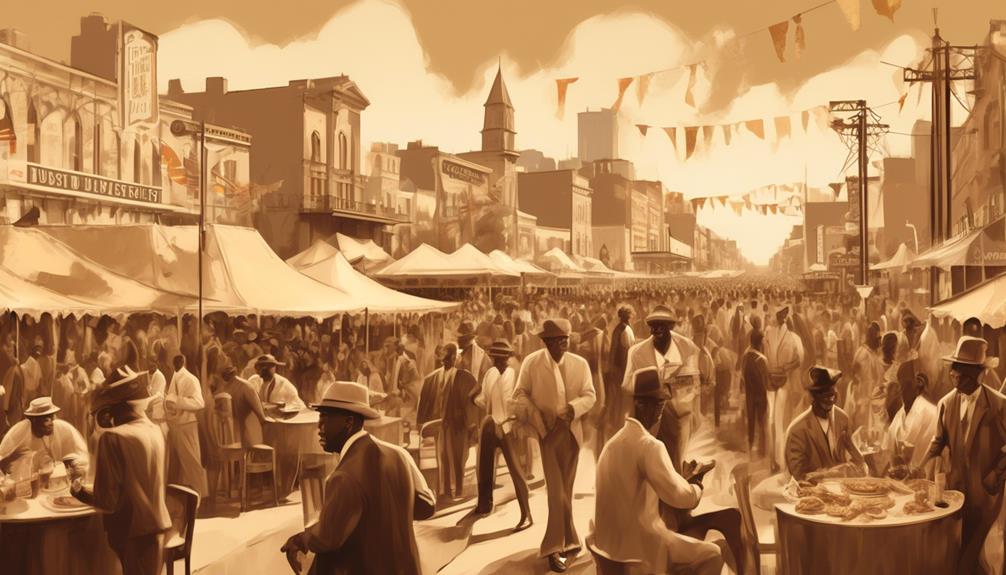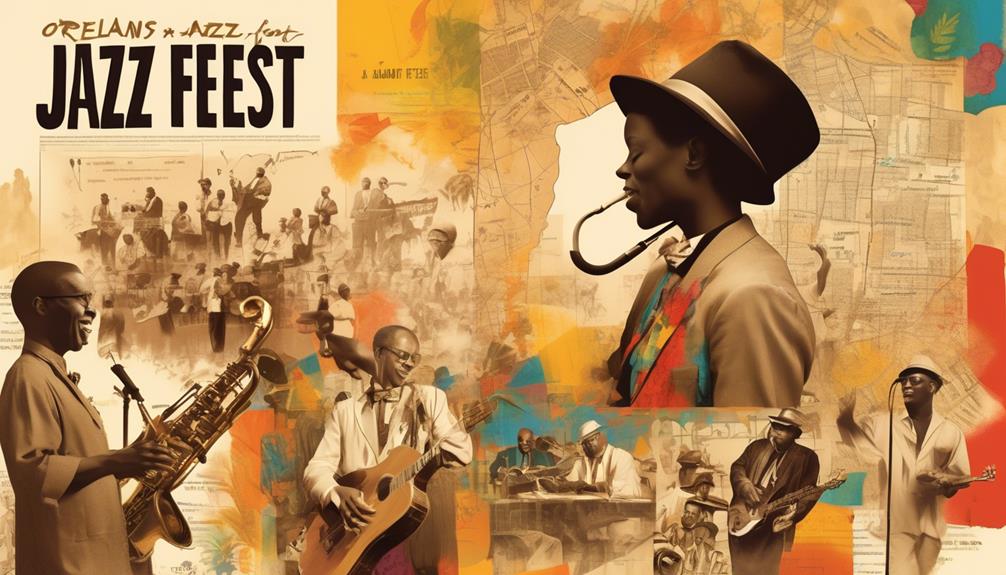
Imagine a vibrant tapestry, woven with threads of rhythm, melody, and cultural heritage; that's the Orleans Jazz Fest for you. You've probably heard about its energy, its music, and its impact, but have you ever wondered about its journey from a humble start in 1970 to a world-renowned cultural festival?
Well, it's quite a story, filled with challenges, triumphs, and changes. It's not just about jazz; it's about the rich Louisiana culture, its people, and its history. So, why not explore this journey, witness how a local festival turned into a cultural phenomenon, and discover what makes the Orleans Jazz Fest more than just an event?
You might find it as intriguing and captivating as the music it celebrates.
Key Takeaways
- The Orleans Jazz Fest was founded in 1970 by the New Orleans Jazz & Heritage Foundation and has evolved over the years.
- The festival has embraced cultural and educational programs, such as the Tom Dent Congo Square Lecture Series and the Don Jamison Heritage School of Music.
- The Orleans Jazz Fest has adapted and expanded post-Katrina, launching new festivals like the Crescent City Blues & BBQ Festival and the Louisiana Cajun Zydeco Festival.
- The festival has had a significant economic impact on New Orleans, boosting tourism and supporting local businesses.
Origins of Orleans Jazz Fest
Founded in 1970, the Orleans Jazz Fest quickly became a cultural cornerstone with the New Orleans Jazz & Heritage Foundation and the New Orleans Jazz & Heritage Festival at its helm. George Wein, a pioneer in the music industry, was instrumental in the first Jazz Fest, setting the stage for a cultural extravaganza that celebrated local culture and heritage. The early years witnessed remarkable events like the Professor Longhair Benefit Concert, embedding the Jazz Fest firmly in the heart of the Crescent City.
The New Orleans International Jazz Festival, as it was initially known, involved local icons like the Preservation Hall Jazz Band. This exemplifies the festival's commitment to preserving and promoting local music and culture. The Jazz Fest's history is a story of growth and evolution, marked by key milestones such as the establishment of Community Partnership Grants. These initiatives deepened the fest's impact, expanding beyond music to education and community development.
Over the decades, the Orleans Jazz Fest has stood as a testament to the city's vibrant culture, celebrating its roots while adapting to the changing times. It's not just a festival; it's a living, breathing part of New Orleans.
Evolution of Festival Features
As the Orleans Jazz Fest grew and evolved, so too did its features, providing a rich tapestry of cultural and educational initiatives that have shaped its unique identity. The Jazz & Heritage foundation, established in 1970, took on numerous projects like the creation of Community Partnership Grants, and the acquisition of WWOZ 90.7 FM license.
These early years also saw the birth of cultural and educational programs. The Tom Dent Congo Square Lecture Series was introduced, along with the Don Jamison Heritage School of Music. Post-Katrina, the Festival showed resilience, launching the Crescent City Blues & BBQ Festival and the Louisiana Cajun Zydeco Festival.
As for the physical growth, the purchase of 1225 North Rampart for renovation marked a significant expansion. In 2015, the George & Joyce Wein Jazz & Heritage Center opened its doors, further solidifying the Festival's presence in New Orleans.
The recent years haven't been any less eventful. The Jazz & Heritage Music Relief Fund was established in 2020, and the year before, the 50th anniversary of the New Orleans Jazz & Heritage Festival was celebrated, a testament to the enduring legacy of Jazz in Orleans.
Recognizing Key Performers

Over the years, you'd notice a diverse range of musicians gracing the Orleans Jazz Fest stage, with Louisiana bands often taking center stage. The New Orleans International Jazz Festival, popularly known as the Orleans Jazz and Heritage Festival, takes pride in recognizing key performers who significantly contribute to the local culture and music scene.
The Executive Director and the Foundation board annually acknowledge the following musicians:
- Rebirth Brass Band
- Dirty Dozen Brass Band
- Allen Toussaint
- Neville Brothers
These artists have consistently amazed audiences with their exceptional performances. The Rebirth Brass Band and the Dirty Dozen Brass Band, for instance, are known for their energetic performances that embody the spirit of New Orleans.
Allen Toussaint, a legendary pianist, and the Neville Brothers, a group famous for their unique blend of funk, jazz, and rhythm and blues, are also among the festival's esteemed performers. They've played a crucial role in preserving and promoting the local music culture. Their performances aren't just entertaining; they're a testament to the rich musical heritage of Orleans.
Impact of The Orleans Jazz Foundation
Delving into the impact of The Orleans Jazz Foundation, you'll uncover how their crucial initiatives have shaped and supported the local music scene since their establishment in 1970. The foundation, initially launched by promoter George Wein and producer Quint Davis, aimed to celebrate New Orleans' vibrant local culture and a vast array of musical styles at the New Orleans International Jazz Festival, colloquially known as 'Fest'.
The Jazz and Heritage Foundation, under the Orleans Jazz Foundation, has done significant work in preserving the culture of New Orleans. Their work extends beyond organizing the Fest. They've established the Heritage School of Music, an initiative offering free music education to the youth. They've also initiated the Congo Square Lecture Series, promoting the understanding and appreciation of the city's African American history.
Furthermore, in response to natural disasters like Hurricane Katrina, they've provided support to the local music community through relief efforts. The Jazz & Heritage Music Relief Fund, established in 2020, is a testament to their continued commitment.
All these initiatives reflect the foundation's dedication to promoting, preserving, and supporting the vibrant musical heritage of New Orleans.
Festival's Economic Development

You mightn't know it, but the Orleans Jazz Fest has played a pivotal role in spurring economic development and boosting tourism in New Orleans, especially during the 1970s and 1980s. When the New Orleans International Jazz Festival was launched, it put the spotlight on the local culture, making the city a must-visit destination for jazz lovers worldwide.
The Jazz Fest's impact is felt not only at the Fair Grounds Race Course, where it takes place annually, but throughout the city. The festival's influence has permeated the local economy in numerous ways:
- The establishment of the Foundation's initiatives:
- The Catapult Fund, offering financial workshops for small businesses in creative industries.
- Purchase and renovation of 1225 North Rampart as The George & Joyce Wein Jazz & Heritage Center.
- The Brass bands and other forms of local culture that have gained international recognition through the fest.
The Jazz Fest's economic development effects continue to this day, with the festival set to run from April 25 to May 5, 2024. It's evident that the Orleans Jazz Fest isn't just an event; it's an economic engine for New Orleans.
Cultural Enrichment Contributions
Beyond its economic impact, the Orleans Jazz Fest has made significant contributions to cultural enrichment, shaping the city's cultural landscape since its inception.
The Joyce Wein Jazz concert series, held annually at the festival, has become a cultural landmark, promoting jazz music as a vital part of New Orleans' heritage.
You might also be familiar with the Jamison Heritage School, a cultural institution that has thrived with the support of the festival. The school has been instrumental in preserving and promoting the city's unique musical traditions.
The Hogan Jazz, another initiative, ensures that the vibrancy of jazz music remains a constant in the city.
The Orleans International Jazz Festival, also known as the ULTIMATE JAZZ FEST, brings together musicians from around the world, further enriching the local culture. The Music Heritage Stage, an integral part of the festival, showcases the best of New Orleans' musical talent.
The festival's contributions go beyond music. The Heritage Music Relief fund, established in response to the challenges musicians face, has provided crucial support.
And let's not forget, every spring, the festival and WWOZ 90.7 FM team up for a concert series, adding another layer to the city's rich cultural tapestry.
Significance of Yearly Posters

Just as the festival's music and events shape the city's culture, the yearly posters of the Orleans Jazz Fest also play a significant role, serving as a visual chronicle of the festival's history and evolution. These posters are more than arts and crafts; they're treasures that capture the essence and vibrancy of this celebration of local culture and music in the birthplace of jazz.
The significance of these yearly posters extends beyond their aesthetic appeal:
- They encapsulate the spirit of the festival in New Orleans, echoing the city's rich cultural heritage.
- Highlighting local favorites, each poster offers a unique insight into the festival's lineup, themes, and featured artists.
- Providing cultural education, they reflect the diverse musical genres and local traditions that define the historic journey of the Orleans Jazz Fest.
The posters also serve as a platform for artistic expression.
- Local and renowned artists contribute their interpretations, enhancing the festival's artistic legacy.
- As collectible memorabilia, they hold historical significance, capturing iconic landmarks and moments, and contributing to the festival's evolution.
Memorable Stages and Tents
Amid the pulsating rhythms and vibrant melodies of the Orleans Jazz Fest, various stages and tents come alive, each offering a unique showcase for local artists and musicians.
The first place you'll encounter is the City Blues Tent, a hub for soulful tunes and local talent.
Then, there's the Congo Square, paying homage to African traditions, it's a significant place in the Rhythms Festival. The Dent Congo Square Lecture series even adds an educational dimension to the fest. The Congo Square stage, called Jazz Fest by the locals, is a vibrant display of cultural tradition.
The Tremé backyard, now a popular venue, reiterates the festival's local roots. In the heart of the city, the Louis Armstrong Park hosts drumming performances that resonate with the Jazz Fest spirit.
You'll also find a partnership with the New Orleans Center for Creative Arts (NOCCA) at work. This alliance provides opportunities for young artists, an initiative that says Jazz Fest is all about nurturing talent.
The official Jazz Fest continues to evolve, maintaining its historic essence while embracing the new. It's a true testament to the city's enduring love for music.
Frequently Asked Questions
What Is the History of Jazz Music in New Orleans?
Jazz music in New Orleans started in the late 19th century, mixing African rhythms with European harmonies. It's evolved, impacting and influencing all genres of music. You can still hear its rich history in the city's music today.
How Did the New Orleans Style Influence Jazz?
New Orleans style greatly influenced jazz by introducing unique rhythms, improvisation, and a blend of many music styles. It's where jazz was born, so your understanding of jazz can deepen by studying New Orleans traditions.
How Many Years Ago Did the New Orleans Jazz Festival Start?
You're asking about the inception of the New Orleans Jazz Festival. It began in 1970, so if we're in 2021, that means it started 51 years ago. Quite a long run for such an iconic event!
What Is the Most Notable Feature in New Orleans Jazz?
You're asking about the most notable feature in New Orleans jazz. It's the improvisation, where musicians freely express their emotions. It's like they're having a conversation, but with instruments. Truly a unique, soulful experience.
Conclusion
So, you've journeyed through the rich history of the Orleans Jazz Fest. It's amazing to think this cultural gem, now attracting over 475,000 attendees annually, started with such humble beginnings.
It's a testament to the power of music, culture, and community. Whether you're a jazz fanatic, a foodie, or an art lover, this festival truly has something for everyone.
It's more than just a festival; it's a celebration of the vibrant spirit of New Orleans.
